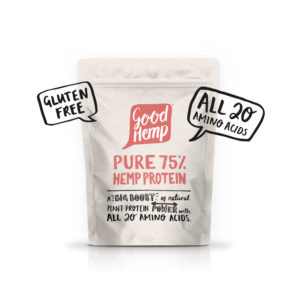6 Steps towards a Zero Waste Home
We’re on a mission to make our factory in North Devon waste-free Every last bit of the hemp seed is used in our oils, milks and protein powders. And they’re delivered to you in leave-no-trace packaging. All the goodness, nothing to landfill.
But that got us thinking: what can we do to cut back on waste when we clock out? Armed with reusable totes and climate-neutral notepads (more on those below), the Good Hemp team tested out some green habit changes and no-fuss hacks you can soon get to grips with at home. Proof that going zero-waste saves time and money as well as the planet.
We’re not expecting anyone to reduce their yearly household waste to a jam jar overnight (big round of applause if you do). But these simple swaps are a good place to start.
1. Shop smarter
The quickest way to reduce waste is cutting back on how much you consume. Before you schlep to the shops, check what you need and make a grocery list. A little effort saves big on time, money and back-of-the-fridge veg going waste. Stale bread can become croutons. Floppy carrots blitzed in a soup. Scraps for compost. When you do shop, try to bring reusable totes, produce bags, jars and old egg cartons. Some supermarkets are beginning to cut back on unnecessary packaging (why else did Mother Nature put bananas in skins?). But farmers’ markets and bulk shops are a better bet for plastic-free options. Or try a veg box from places like Riverford and Oddbox.
2. Create a capsule wardrobe
Minimalist wardrobes are all the rage… when you can be bothered getting out of joggers. Fewer impulse purchases mean more money for better-quality threads. And learning a few sewing hacks (or finding a decent tailor) will make them last a little longer. That means less going to landfill and less ‘what am I going to wear today?’ drama. Bookworms: if you’ve not already traded in paperbacks for an e-reader, pick up your next read secondhand. Better still, start a book swap or flick through the shelves of your local library.
3. Work from home efficiently
Working from home? Congratulations, you’re saving the planet by cutting out (or cutting down) the commute. Taking the foot off the gas. With no more office printer or stationery cupboard to raid, try going paperless. Or opt for eco-friendly office supplies. We keep track of our Good Hemp meetings in the world-first climate-positive diary by A Good Company. It’s harder to avoid the carbon emissions caused by data, but dimming your screen, bookmarking web pages and unplugging electronics helps keep your WFH footprint a little lighter.
4. Choose reusables
Keys? Check. Phone? *Pats pocket.* Tote? Three, actually. And an insulated water bottle. If you’re anything like us, reusables have become a staple in the leave-the-house ensemble. Now it’s time to blitz those disposables at home. Try Stasher bags and beeswax wraps which keep food as fresh as cling film. You won’t miss kitchen roll, but will enjoy the savings you’ll make using super-absorbent, multi-use bamboo towels. In the bathroom: reusable razors, menstrual cups and fabric rounds for removing make-up. And if you’ve got kids, choosing reusable diapers will save about 4,000 nappies going to landfill for every child.
5. Clean up your cleaning act
With bicarb, white vinegar and elbow grease, you can get your home looking spick and span. But companies such as Homethings and Bower Collective are making life easier with planet-friendly cleaning products that have all the muscle and none of the single-use plastic. Make the switch from disposable, virgin-plastic sponges to coconut-fibre scourers and plant-based loofah (EcoVibe has a great selection). Clothing too past-it for the charity shop can be repurposed as cleaning rags, and old toothbrushes are brilliant for scrubbing those hard-to-reach places.
6. Save water
The Environment Agency says that unless we start saving water, the UK will be facing shortages by 2050. So here are some simple ways to start: fill the washing machine and dishwasher completely before setting off; put a Hippo bag in your toilet cistern to flush with less water; and fill the kettle with just only as much as you need. Plant lovers: pop a bucket in the shower to collect water as it heats, and use it to give your greenery a drink. Bonus: less money down the drain too.


